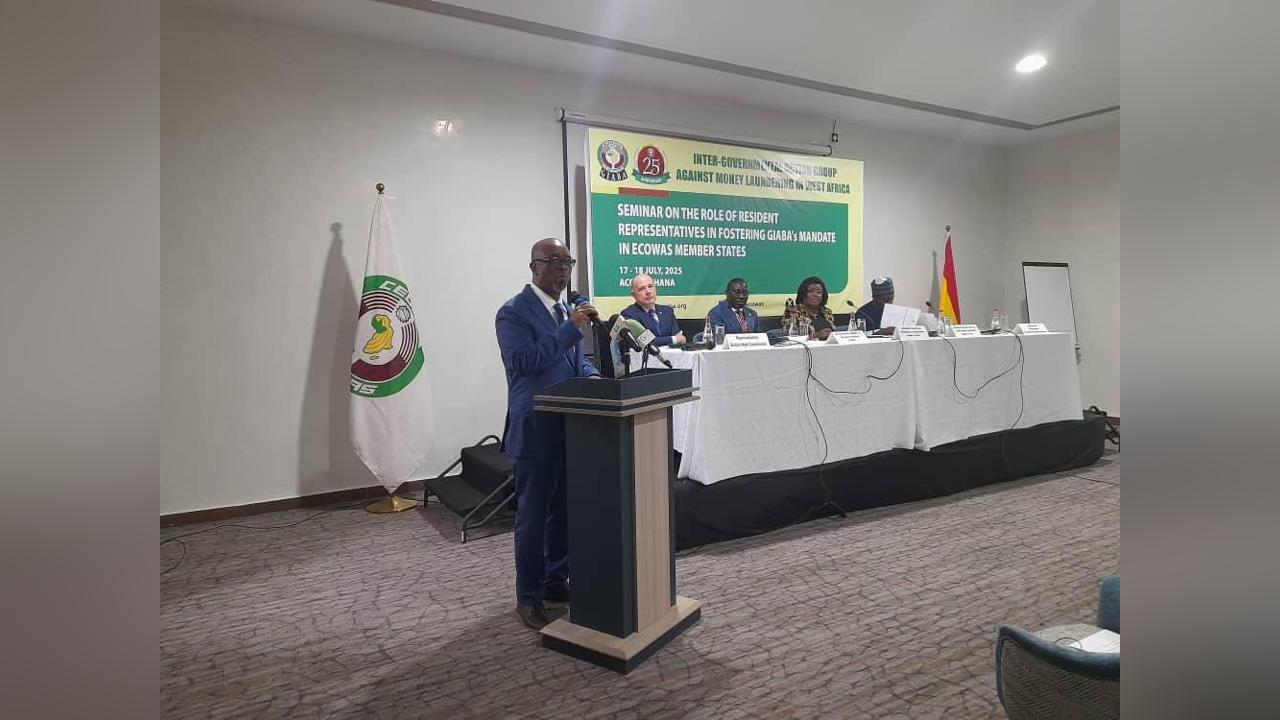Africa-Press – Ghana. ECOWAS Resident Representatives of member States have been encouraged to leverage their strategic influences, to promote high-level political commitment for Anti-Money Laundering, Countering the Financing of Terrorism and Proliferation Financing (AML, CFT, CPF) reforms.
Mr Albert Boafo, the Chief Executive Officer (CEO) of the Financial Intelligence Centre (FIC), gave the encouragement at the opening of a two-day seminar in Ghana, on the role of ECOWAS Resident Representatives in fostering AML, CFT, CPF compliance in member States, being held under the auspices of the Inter-Governmental Action Group against Money Laundering in West Africa (GIABA).
He said as resident Representatives, they were not only the face of ECOWAS in their respective countries, but served as the crucial link between GIABA’s technical work and the national political and institutional actors who must implement such reforms.
The seminar would enhance the capacities of the participants, providing them with a unique platform to re-strategise on leveraging their influences in the implementation of AML, CFT, CPF frameworks across the West African sub-region, to combat financial crime.
He said participants must be empowered to be able to facilitate robust and consistent engagement between GIABA and national authorities, advocate for adequate resourcing of national AML, CFT, CPF frameworks and institutions, and promote strengthened accountability mechanisms for timely and effective implementation of regional commitments and decisions.
Mr Boafo, who is also GIABA’s National Correspondent, gave some background on the twin scourges of Money Laundering and Terrorism Financing (ML/TF), which continued to threaten the peace, stability and economic development of member States.
However, AML, CFT, CPF compliance transcended mere technical obligations or the pursuit of international recognition, saying, “At its core, it is about preserving the integrity of our economies, shielding financial systems from exploitation, and preventing the flow of illicit funds that may support terrorism, organised crime, or erode the foundations of the rule of law”.
He said implementation of the Financial Action Task Force, (FATF) Recommendations, to which all ECOWAS member States were firmly committed, demanded not only technical competence, but also unwavering political commitment.
“As resident representatives, you occupy a strategic position to galvanise this political will and foster sustained national ownership of the AML, CFT, CPF agenda,” he said.
He said the meeting had come at a time when GIABA was starting the third round of Mutual Evaluation of its member States, while others were under the FATF International Co-operation Review Group, (ICRG) process and implementing national actions plans to address identified deficiencies and the success of these processes depended greatly upon sustained political engagement and cross-sectoral coordination.
“Your ability to engage national stakeholders from Ministers and Central Bank Governors to law enforcement agencies and Financial Intelligence Units, is therefore critical to ensuring that GIABA’s efforts are not only understood, but also supported and owned at the national level,” he said.
Mr Edwin W. Harris Jnr, the Director-General of GIABA, emphasised the urgent need for collective efforts to counter Illicit Financial Flows (IFFs) to foster stable national economies, peace, and societal development in the sub-region.
He highlighted several achievements of GIABA, which included increasing performance, restoring its global reputation and identity, removing several of its member States from the FATF grey list and enhancing its compliance audit recommendations.
Mr Harris said GIABA would in December this year, celebrate its Silver Jubilee to mark 25 years of its existence, and looked forward to new opportunities and reworking of it mandate to include other cross-cutting thematic areas.
Ambassador Mrs Perpetua O. Dufu, the Coordinating Director, Multilateral and International Organisation, Ministry of Foreign Affairs and Regional Integration, commended GIABA for its sustained efforts towards capacity building for member States.
She warned that the sub-region was already contending with economic vulnerabilities and transnational threats and could not afford the cost of inaction.
She said ML and related financial crimes were not abstract technical challenges, but had real and devastating impacts, including weakening public institutions, distorting economies and fuelling insecurity across borders and though compliance was key, it was not an end in itself.
It must translate into stronger institutions, increased transparency and ultimately enhance trust in the rule of law and financing system.
Mrs Dufu recounted some of Ghana’s notable achievements, including upholding to the standards set by GIABA, and aligning national frameworks with global AML and CFT norms and reaffirmed the country’s commitment to supporting GIABA and ECOWAS in strengthening financial oversight frameworks.
Ambassador Mohammed Lawan Gana, the ECOWAS Resident Representative in Ghana, stressed the importance of sustained political will, commitment, and public engagement for ownership of existing provisions; and the need for inward looking to address the root causes of illicit financial flows, including weak governance, endemic corruption, declining value systems, lack of transparency, and organisational systemic issues.
He also recommended the strengthening of regional intelligence sharing and technological modernisation, considering the increasing convergence between insecurity and financial crimes in the sub-region.
“In an era of rapid globalisation and digital financial transactions, the challenges posed by money laundering and terrorist financing had grown increasingly complex,” threatening the integrity of financial systems, and undermining national and international security by enabling acts of violent extremism that claimed innocent lives.
Ambassador Gana said GIABA had, since 2022, played a central role in supporting member States to prevent and combat money laundering and counter-terrorist financing among others, citing the development of the AML-CTF framework in line with international standards, notably those established by the FATF.
He further alerted on the need for social-re-engineering of the collapsed value systems arising from the lust for money and the “get rich quick” syndrome.
He urged governments to walk-the-talk to deliver the dividends of democracy by improving the welfare of citizens to eliminate temptations to jump into criminality.
For More News And Analysis About Ghana Follow Africa-Press







